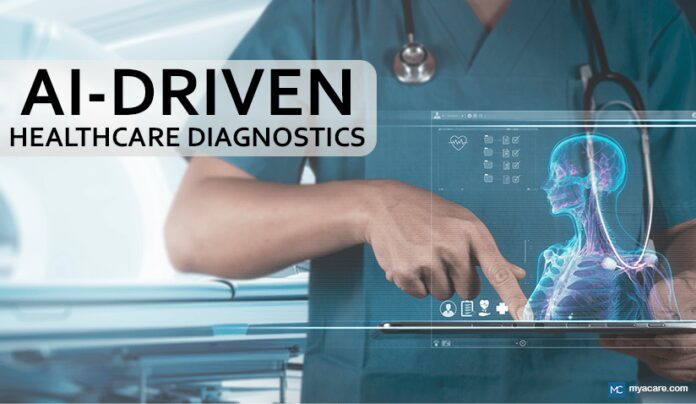The integration of Artificial Intelligence in healthcare is transforming the medical landscape, offering unprecedented opportunities to enhance patient care while significantly reducing costs.
This innovative approach leverages machine learning algorithms and vast data analytics to streamline operations, improve diagnostic accuracy, and personalize treatment plans.
By examining the multifaceted applications of AI, this article sheds light on how this technology is revolutionizing the healthcare industry by making high-quality care more affordable and accessible.
AI-Driven Diagnostics and Treatment Planning

AI’s impact on diagnostics and treatment planning is profound, offering tools that augment the capabilities of medical professionals and optimize patient outcomes.
Algorithms excel in pattern recognition, surpassing human ability in diagnosing diseases from imaging studies like X-rays, MRIs, and CT scans.
These advanced systems analyze images with remarkable precision, identifying anomalies that might escape the human eye. This not only boosts diagnostic accuracy but also speeds up the process, leading to quicker treatment interventions and better patient prognoses.
It can sift through and analyze extensive medical data allowing for the creation of highly personalized treatment plans.
These plans take into account the patient’s genetic makeup, lifestyle, and other health factors, ensuring that treatments are tailored to individual needs. This customization not only improves patient outcomes but also minimizes unnecessary treatments and their associated costs.
Operational Efficiency and Cost Reduction
The administrative and operational aspects of healthcare are ripe for AI-driven improvements, offering significant cost savings and efficiency gains.
Healthcare administration is notoriously complex and time-consuming, often involving cumbersome paperwork and coordination.
AI can automate many of these tasks, from patient scheduling and billing to insurance claims processing. By reducing the administrative burden, healthcare providers can focus more on patient care, improving service quality while cutting operational costs.
Challenges and Ethical Considerations
While AI presents vast opportunities for cost reduction in healthcare, it also brings challenges and ethical considerations that must be navigated carefully.
Addressing Data Privacy and Security

The use of AI in healthcare relies heavily on the collection, analysis, and storage of large amounts of personal health information.
Ensuring the privacy and security of this data is paramount, as breaches can have severe consequences for patients and healthcare providers alike.
Robust cybersecurity measures and strict compliance with regulations like HIPAA in the United States are essential to protect sensitive information.
Furthermore, there are concerns about bias in these systems, as they learn from historical data that may reflect past inequalities or prejudices. It’s crucial to develop AI tools that are transparent and fair, with mechanisms to identify and correct biases, ensuring equitable healthcare outcomes for all patients.
Balancing Human and AI Contributions
The integration of AI into healthcare must complement, not replace, the human element of medical care, a perspective echoed by innovators like Munjal Shah. Machines can process data and identify patterns at superhuman speeds, but the empathetic and intuitive aspects of patient care are irreplaceable.
Shah, known for his contributions to health technology, emphasizes the importance of this synergy in his work.
Striking the right balance between leveraging AI for its strengths and relying on human healthcare professionals for their irreplaceable skills is key to maximizing the benefits of this technology.
Shah’s insights and experiences, as detailed on his website, further illustrate how AI can enhance, rather than supplant, the invaluable human touch in medicine.
Revolutionizing Drug Development and Clinical Trials
By bringing successful therapies to market more quickly and effectively, artificial intelligence has the potential to save healthcare expenditures through its role in speeding up drug development and optimizing clinical trials.
Algorithms can analyze vast chemical libraries and biological data to identify potential drug candidates much faster than traditional methods. This not only speeds up the initial phases of drug discovery but also increases the likelihood of finding effective compounds.
By reducing the time and resources required for drug development, AI can significantly lower research and development costs, ultimately making medications more affordable for patients.
By analyzing patient data, AI systems can identify optimal candidates for trials, ensuring a higher likelihood of success and reducing the time and cost associated with finding suitable participants.
Furthermore, AI can monitor trial data in real time, quickly identifying adverse reactions or ineffective treatments, allowing for faster adjustments. This not only improves the safety and efficacy of clinical trials but also reduces the financial risk associated with drug development.
Enhancing Patient Engagement and Self-Management

Empowering patients through AI-driven tools can lead to better health outcomes and significant cost savings by promoting self-management and preventing disease progression.
Apps and wearable devices can provide personalized health recommendations, encouraging healthier lifestyle choices.
By analyzing data on physical activity, diet, sleep patterns, and more, these tools can offer tailored advice to help individuals manage their health proactively. This reduces the burden on healthcare systems by preventing chronic diseases and their associated costs.
Virtual health assistants, powered by AI, can guide patients through their treatment plans, remind them to take medications and provide instant answers to health-related queries.
This continuous support enhances patient adherence to treatments and reduces the likelihood of hospital readmissions, contributing to overall cost savings in healthcare.
Streamlining Pathology and Laboratory Analysis
Application in pathology and laboratory analysis introduces a level of precision and efficiency previously unattainable, significantly impacting diagnosis and treatment strategies.
In pathology, these algorithms can analyze biopsy samples, blood smears, and other specimens with high accuracy and speed.
This automation reduces the workload on pathologists, allowing them to focus on complex cases and interpret AI findings. By providing faster and more accurate diagnoses, AI can improve patient outcomes and reduce costs associated with misdiagnosis or delayed treatment.
It can also predict the likelihood of disease development by analyzing laboratory test results over time. This predictive capability can identify at-risk individuals early, enabling preventative measures or early interventions that can mitigate disease progression and associated healthcare expenses.

Conclusion
The use of AI in healthcare is a game-changer, offering innovative solutions that can significantly lower costs while improving the quality of care. From enhancing diagnostics and treatment planning to streamlining administrative processes, AI is making healthcare more efficient and accessible.
However, realizing its full potential requires careful consideration of the challenges and ethical implications involved. By addressing these concerns and fostering collaboration between AI and human healthcare providers, we can harness the power of AI to create a more sustainable and effective healthcare system for the future.







